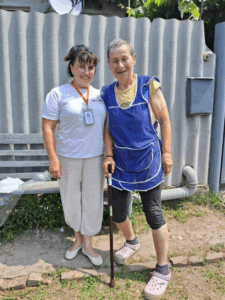
First published August 28, 2024 by FHI 360
All illustrations are credited to Yemen Ministry of Public Health and Population Guidelines
Nabihah first heard about Hanan through other women in her village along the west coast of Yemen. Hanan leads a weekly mother-to-mother support group, with sessions focusing on infant and young child feeding and nutrition — a relevant topic for Nabihah, who was pregnant with her fifth child.
Hanan visited Nabihah’s home and invited her to a session. At the time, Nabihah says, “there was no one” to support mothers to breastfeed. Wanting to learn more, Nabihah decided to attend.

As crises compound, malnutrition soars
Since its civil war began in 2015, Yemen has experienced one of the world’s worst humanitarian crises. The country faces high levels of violence and insecurity, and an economic crisis is threatening the government’s ability to offer public services. Domestic and external shocks, including conflict and extreme weather events, exacerbate the challenges.
Women and their children are severely impacted. Recent data estimates that in 2024, 5 million children under 5 and 2.7 million pregnant and lactating women will require treatment for acute malnutrition.
FHI 360 is working to alleviate the problem through support groups like the one Hanan leads. The groups provide a venue for women to discuss infant and young child feeding issues and share their experiences overcoming problems. The model has been shown to improve infant and young child feeding practices in emergency contexts.
Since 2023, FHI 360 has supported groups in five locations in the south of the country, adopting guidance and recommendations from the Yemen national guidelines and drawing on our experience in similar contexts, such as the Democratic Republic of Congo, Ethiopia and northeast Nigeria.

Breastfeeding and complementary feeding for a strong start
Adequate nutrition during the 1,000 days between pregnancy and a child’s second birthday sets the foundation for lifelong health. Breastfeeding saves lives, helping to prevent malnutrition and disease, and appropriate, safe and timely complementary feeding (when children, beginning at 6 months, eat food to complement breast milk) helps ensure infants have the nutrients they need to thrive.
The support groups — which are generally made up of pregnant women and mothers of children under 2 — help protect, promote and support breastfeeding and complementary feeding. They “are a vehicle for behavioral change, valuing each member’s experiences, views and opinions,” says one lead mother, noting that they provide an opportunity for women to receive and give support “without being judged or shamed.”

FHI 360 selected lead mothers like Hanan based on their community knowledge, success in practicing infant and young child feeding practices, communication skills, and time available to dedicate to the group. After completing a six-day training on facilitation and infant and young child feeding best practices, lead mothers begin hosting weekly meetings in their homes, using educational materials to complement discussions. They also connect with a health facility and community health volunteers so they can share updates and challenges.
“The members of the mother-to-mother support groups are leading and supporting each other in adapting positive behaviors that are helping their children be healthy and grow well, despite the situation,” says Mohanad Ibrahim, a community officer for FHI 360 in Yemen.
As of December 2023, 24 groups have been established, with more than 260 women participating.
Correcting misconceptions and adopting healthy behaviors

Hanan — who has a 12-year-old boy and a 5-year-old girl — says that the biggest challenge local mothers face is a lack of awareness.
“We used to feed our children based on the instructions of our mothers and grandmothers, which were often based on misconceptions,” she says. Her own mother, grandmother and neighbors advised her to give her children sugar water (which is not nutritious) and to discard her colostrum (the nutrient-dense first form of breast milk produced after birth).
Through her training and participation in the group, Hanan learned that these ideas are misconceptions — and gained accurate information about breastfeeding, complementary feeding, hygiene, and the importance of prenatal care for pregnant women and vaccines for babies and children.
Changing behaviors takes time and practice. At first, Hanan doubted some of the information she heard and struggled to put it into practice. “However,” she says, “we persisted in learning and applying it correctly.”
“My child’s comfort is my comfort”
It’s been two years since Nabihah first attended a session, and she still attends often. Like Hanan, she also had early doubts; members of her community had warned her that a newborn could die without water (in fact, newborns only need breast milk and should not drink water). But a desire for knowledge drove her to keep attending.
“I was determined to learn for myself, and I benefited greatly from Hanan’s guidance,” Nabihah says. At first, she faced challenges with expressing milk and breastfeeding. But “I applied all the information she provided, and when I saw improvements in my children’s health, I continued to attend the sessions regularly.”
Other participating mothers report that their children had increased immunity and improved health due to changes they made after lessons.
“It affected my comfort because my child’s comfort is my comfort,” says one group member.

Related Articles

Mobile Medical Clinics Expand Health Care Access in Ukraine
FHI 360’s mobile medical teams bring rehabilitative care to conflict-affected communities in Ukraine, helping elderly residents regain mobility and independence amid ongoing war.

Meet the Imam Combining Faith and Public Health to Support Tuberculosis Patients
In Tajikistan, Imam Sharifzoda Azalshoh has partnered with FHI 360 to reduce tuberculosis. His pioneering approach—linking religious leadership with patient support and stigma reduction—demonstrates the vital role communities play in advancing health and hope.

Healing on the Move: Mobile Medical Teams Bring Hope to Displaced Communities in Tigray
Mobile medical teams in Tigray, supported by FHI 360, provide free healthcare to displaced communities affected by Ethiopia’s civil war, offering essential medical care, mental health support, and medications directly at displacement camps.
